Every 19th of November, International Men’s Day is marked globally—including in Nigeria, Ghana, and across Africa—as a time to spotlight men’s mental health and challenge long-standing social norms around masculinity.
The 2024 observance revolves around the theme “Positive Male Role Models.” This theme invites all communities to foster open, stigma-free conversations about mental health so men can be heard, supported, and empowered.
While International Men’s Day encourages all men to speak freely about their mental health, many still face daunting barriers. In Nigeria and West Africa, societal and cultural expectations often prevent men from seeking the support they may desperately need.
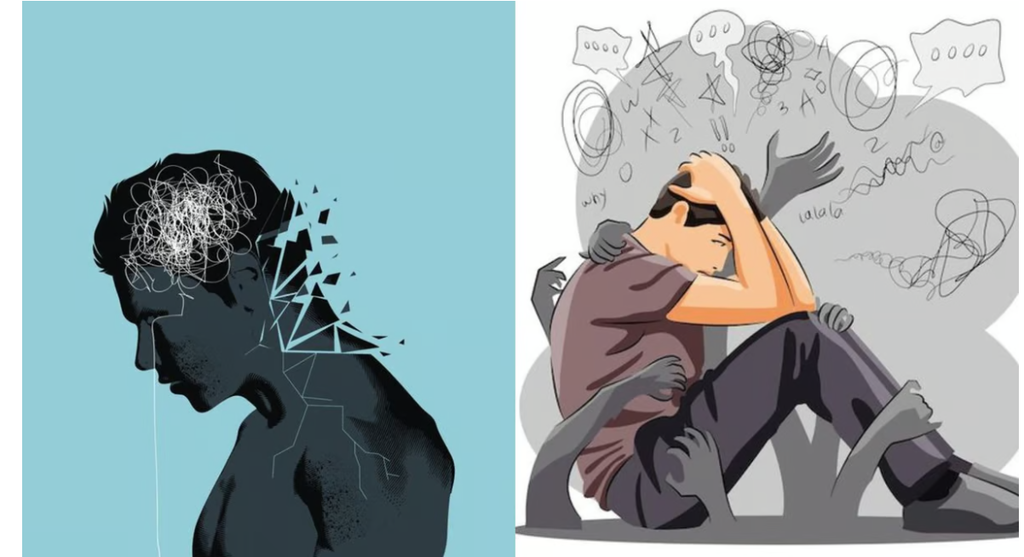
Men’s mental health is important
Across the continent, traditional beliefs have shaped the idea that men must be strong, silenced, and emotionally unshakeable. This cultural script stretches well beyond Nigeria—from Lagos and Abuja to Accra and beyond—and it too often leaves men to bear emotional pain alone.
In honour of World Men’s Mental Health Day, everyone is encouraged to join a conversation that is urgent and overdue: let’s remind the men in our lives—fathers, brothers, sons, uncles, colleagues—that seeking help is not a sign of weakness, but a mark of true courage.
The Heavy Burden of “Being Strong”
From early childhood, many Nigerian boys hear phrases like “boys don’t cry” or “big boys don’t show tears.” These messages echo through homes, schools, and media, shaping beliefs that emotional openness is unmanly. Similar attitudes span much of West Africa—according to Lagos-based psychologist Dr. Ifeanyi Adigwe, “Generations of men have learned to bottle up their feelings out of fear of being judged or considered weak.”
This constant demand for stoicism doesn’t shield men; instead, it intensifies a sense of isolation. Nigerian and Ghanaian men are often told to “be a man” and “solve your own problems”—views echoed in many households and workplaces.

Suppressing your emotions as a man does notmean you are masculine
Sadly, this mindset can fuel harmful patterns. Research published by the World Health Organization indicates that men globally are less likely than women to seek professional help for conditions like depression, anxiety, or trauma. According to the WHO, men account for around 75% of suicides worldwide, a trend visible in Nigeria and much of Africa. Nigerian experts have also observed an uptick in substance misuse, anger issues, and self-harm among young men—all too often linked to unaddressed mental distress.
Shattering the Silence: Why It Matters
Recognising mental health challenges as normal—not shameful—is the first step towards healing. Mental health is just as crucial as physical health, impacting a person’s relationships, work, and overall quality of life. The silence around men’s mental health in Nigeria, Ghana, and beyond causes pain not just for individuals, but their families and wider communities.
1. Embracing Emotional Expression
A core solution is to make emotional openness normal and acceptable. Acknowledging feelings—whether joy, grief, or worry—does not compromise a man’s character. In fact, sharing such feelings can build genuine strength and resilience. In Nigerian society, where men often carry the expectations of entire families or communities, having a trusted support network—including loved ones and professionals—is vital for healing and personal growth.
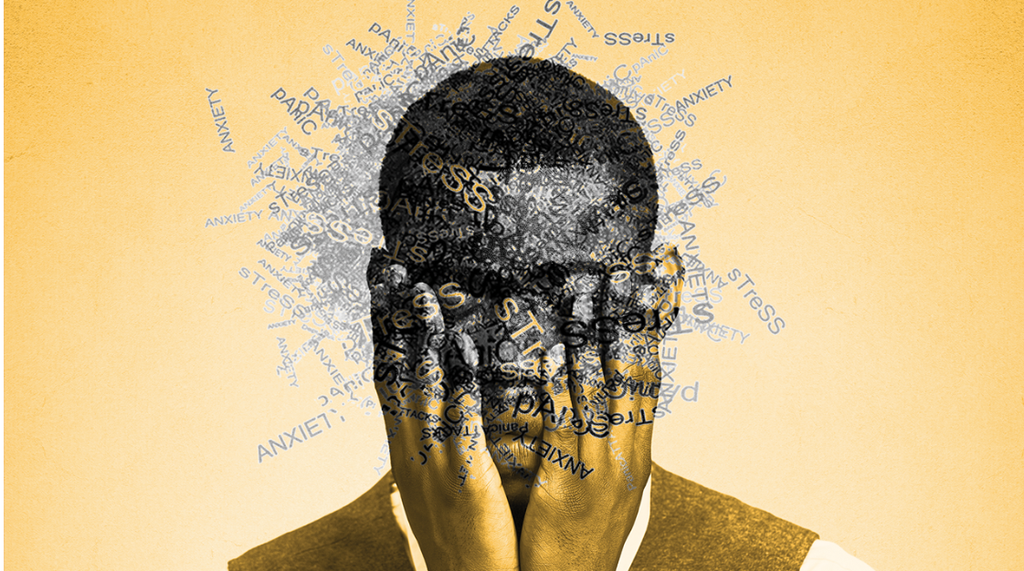
Asking for Help Shows Strength Not Weakness
Seeking help—whether through counselling, therapy, or simply talking to a friend—should be celebrated. Advocacy groups in Nigeria, such as MANI (Mentally Aware Nigeria Initiative), have launched campaigns encouraging men to reach out, highlighting that true masculinity includes the courage to be vulnerable.
2. Safe Spaces for Honest Dialogue
Building safe, supportive environments is essential to addressing men’s mental health needs. These can be found in youth groups, churches, mosques, barber shops, or workplace “wellness corners.” When Nigerian men feel listened to without judgment, they are far more likely to share their challenges and take steps towards healing. This principle also applies to Ghana, where mental health advocates note the benefits of men’s discussion circles—informal gatherings where men can talk openly.
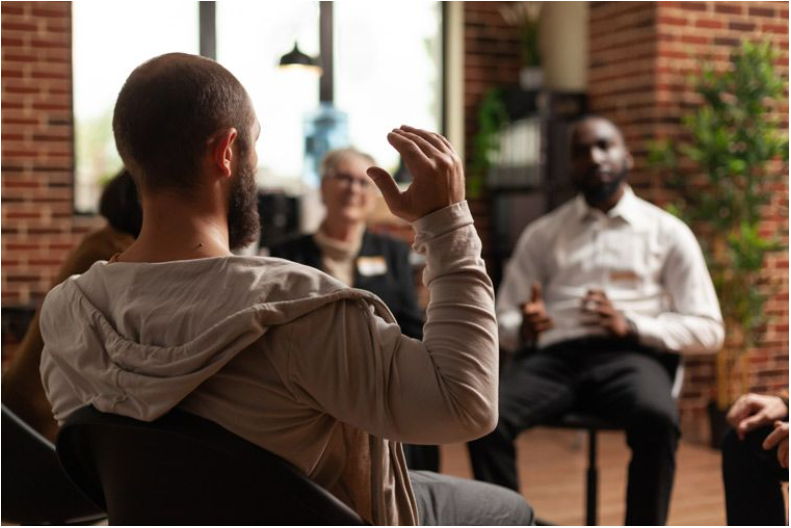
Men in therapy
Employers and local leaders can also play a role. By offering mental health resources and ensuring staff will not be penalised for seeking support, organisations make a powerful statement: “You matter. Your health matters.” Some multinationals operating in Nigeria are now providing confidential hotlines, workshops, or “mental health days” to support male employees—an encouraging sign, though more needs to be done across industries.
3. Public Figures and The Power of Example
Celebrity and community leaders have significant influence. Nigerian footballer John Obi Mikel and Ghanaian musician Sarkodie have used their platforms to speak about stress, depression, and the importance of seeking help—making it easier for other men to follow suit. Internationally, athletes such as Kevin Love and DeMar DeRozan have also shared personal stories, proving that mental health affects people at every level of success and fame.
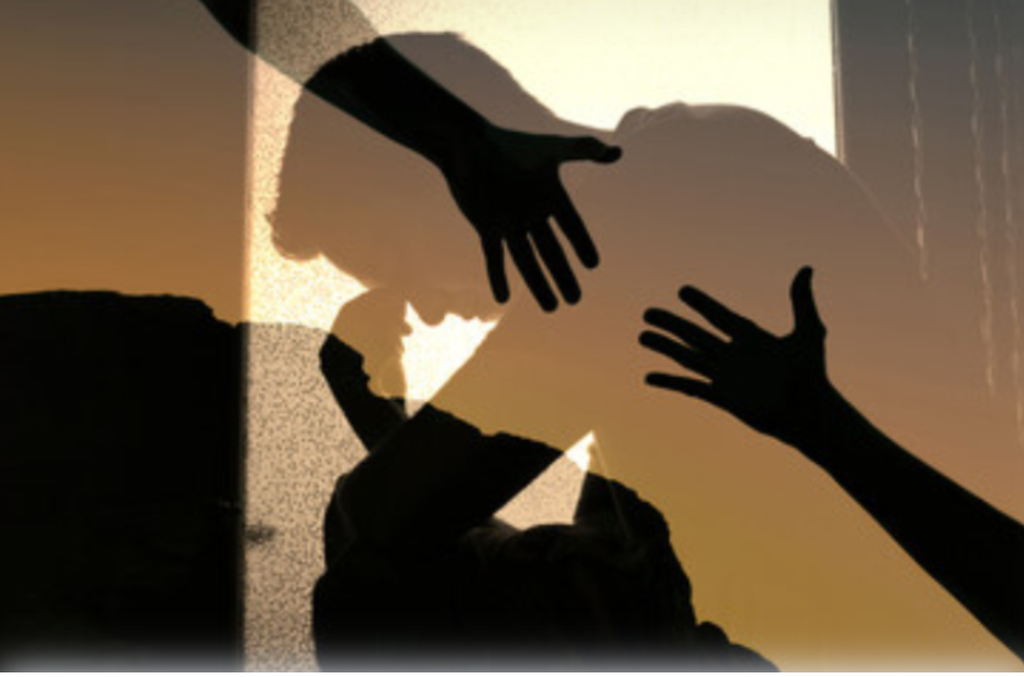
Encourage men to speak up
When celebrities are open about their struggles, it offers everyday Nigerians and Ghanaians a sense of solidarity and hope. For many, this visibility breaks down the myth that mental health difficulties are rare or shameful, making the journey to recovery more approachable.
Athletes, actors, and musicians continuing to speak out can play a key role in driving community-level change, making it easier for the average person—to open up and seek help when needed.
4. The Importance of Early Intervention
Teaching boys, from a young age, that emotions are normal and help is always available lays the groundwork for a healthier society. Schools in Nigeria and Ghana are slowly introducing mental health education, though gaps remain—especially in rural areas. Charities and religious groups are stepping in to provide support and ensure that children learn “talking is strength.”
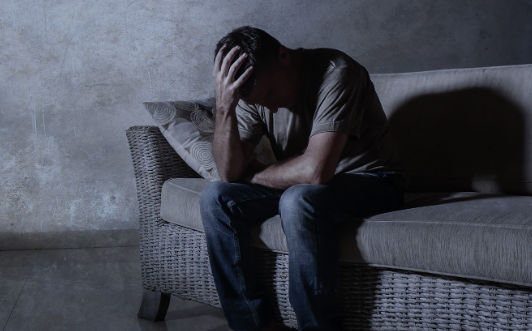
A man suffering from depression
It is vital to dispel the myth that therapy or counselling is only for moments of crisis. As pointed out by Lagos-based therapist Busola Okeowo, “Therapy should be seen as mental fitness—it is for anyone who wishes to improve their well-being, not just those facing extreme challenges.” Early, proactive care can prevent more serious problems down the line and foster long-term emotional resilience.
A Roadmap for Progressive Change
As West Africans and the broader continent reflect on World Men’s Mental Health Day, it is clear that ending the silence around men’s mental health requires a collective, consistent effort. This means confronting harmful stereotypes, actively supporting men to share their stories, and ensuring access to resources at every level—from village health posts to city hospitals and workplaces.
If you or someone you know is struggling, remember: reaching out is a sign of strength. Support can come from a trusted friend, a professional, or a community group. Every conversation matters, and taking even the smallest step to open up can set the stage for healing.
For those with loved ones who may be facing silent struggles, compassion and regular check-ins can have a life-changing impact. Listen more, judge less, and build the kind of environment where everyone—regardless of gender—feels seen and valued.
By making space for these conversations and challenging old stereotypes, we contribute to a more inclusive, understanding, and mentally healthy Nigeria, Africa, and world.
Lend your voice today—let’s make a world where it’s truly okay not to be okay.
What’s your own view on men’s mental health? Have you or someone you know faced challenges or found support in Nigeria or Ghana? Drop a comment below and join the conversation—your perspective matters!
Have a story or personal experience about mental health, stigma, or breaking the silence? Want your story posted or wish to sell your experience? Reach out to us at story@nowahalazone.com.
For more mental health updates, expert interviews, and lifestyle stories from Nigeria and across Africa, don’t forget to follow us on Facebook, X (Twitter), and Instagram.
Together, we can create a supportive community—your story may inspire someone else to seek help or simply know they’re not alone.










